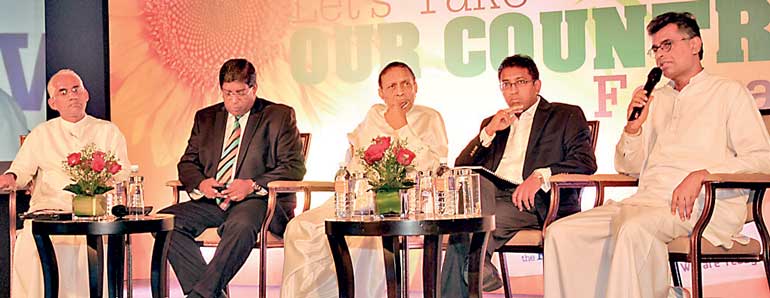Wednesday Feb 18, 2026
Wednesday Feb 18, 2026
Wednesday, 12 August 2015 01:08 - - {{hitsCtrl.values.hits}}
 A seemingly upbeat United National Front (UNF) yesterday wooed the business community with their five-point action plan. From left: Deputy Minister of Highways and Investment Promotions Eran Wickramaratne, Minister of Finance Ravi Karunanayake, Minister of Buddha Sasana, Public Administration and Democratic Governance Karu Jayasuriya, Deputy Minister of Policy Planning and Economic Affairs Dr. Harsha de Silva and Minister of Power and Energy Patali Champika Ranawaka
A seemingly upbeat United National Front (UNF) yesterday wooed the business community with their five-point action plan. From left: Deputy Minister of Highways and Investment Promotions Eran Wickramaratne, Minister of Finance Ravi Karunanayake, Minister of Buddha Sasana, Public Administration and Democratic Governance Karu Jayasuriya, Deputy Minister of Policy Planning and Economic Affairs Dr. Harsha de Silva and Minister of Power and Energy Patali Champika Ranawaka
By Charumini de Silva
Less than a week before the decisive general election, the United National Front for Good Governance (UNFGG) yesterday revealed its action plan for the economy on private sector-led growth.
Organised by the Industry and Commerce Forum, the event involved discussions specifically relating to the economy, business and industry.
Giving an overview of the action plan, Buddha Sasana, Public Administration and Democratic Gover-nance Minister Karu Jayasuriya said as a Government they believed in private sector-led growth based on a five-point plan of operation for the country.
The five-point plan covers the growth of the economy, fighting corruption, ensuring freedom for all, investment in infrastructure and improvement of the education system.
Clarifying his point further, Jayasuriya said that it was important for the Government to provide infrastructure, but the creation of wealth in the administration of Prime Minister Ranil Wickremesinghe and President Maithripala Sireisena would be in the hands of the private sector.
Highlighting the transformation which took place in the economy since January, Finance Minister Ravi Karunanayake said: “It was like a grenade handed over to us without a pin. Many of you thought it would explode, but today you can see that the rupee is in a stable position, reserves are in a healthy position, overall revenue is going up, costs are coming down and as a result there is hope for tomorrow.”
He added that the combination of President Sirisena and Prime Minister Wickremesinghe had certainly paid dividends to the public that longed for good governance in the system.
“We would like to see this as a continuous process. We have been going down byroads and it is time that we try the expressway. We are a Government which is willing to learn from the people. Together we can make that difference,” Karunanayake said.
Deputy Minister of Policy Planning and Economic Affairs Dr. Harsha de Silva said that Sri Lanka messed up its priorities in the past and the only way out of it was through its exports.
He said that unless the country started producing products and services that were competitive internationally, there was a good chance that the economy would fail.
“Either we export or we perish — that is the simple fact of life.”
However, the Deputy Minister said that with the implementation of a five-point economic action plan they were confident of turning the ship around to create the most competitive economy in the region.
Highways and Investment Promotions Deputy Minister Eran Wickramaratne said: “With the return of our Government we will probably increase our investments by 50% from $ 1 billion to $ 1.5 billion by the end of the year.”
Looking at this projection, he said by 2017 Sri Lanka could increase its investments to about $ 3 billion.
He went on to place emphasis on policy consistency, public transport investments, housing and attracting high science investments.
Power and Energy Minister Patali Champika Ranawaka said that in order to achieve rapid and sustainable growth, Sri Lanka needed to transform the economy into a knowledge base driven by advanced technology and innovation.
He said the aim was to make Sri Lanka self-sufficient in energy by 2025.